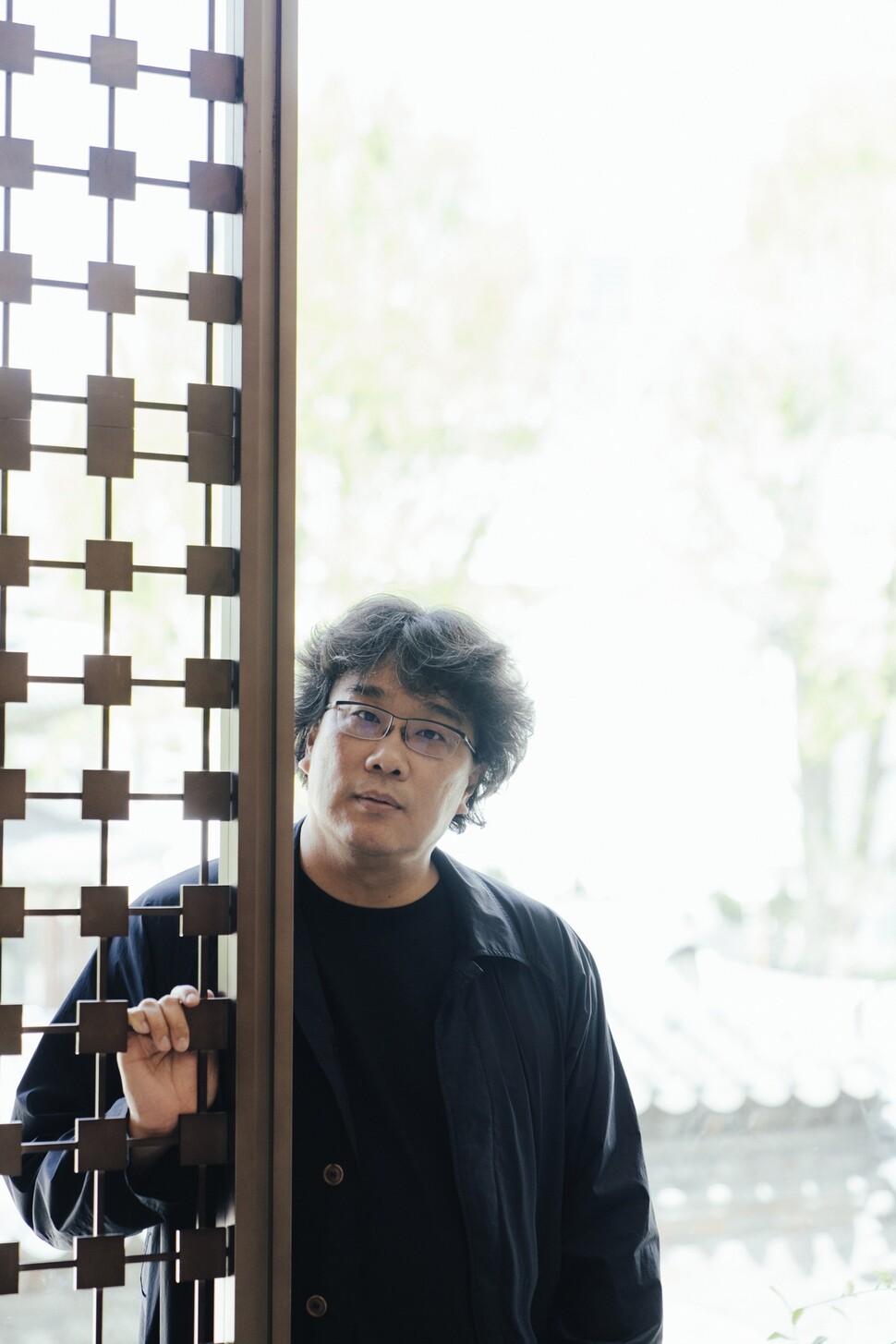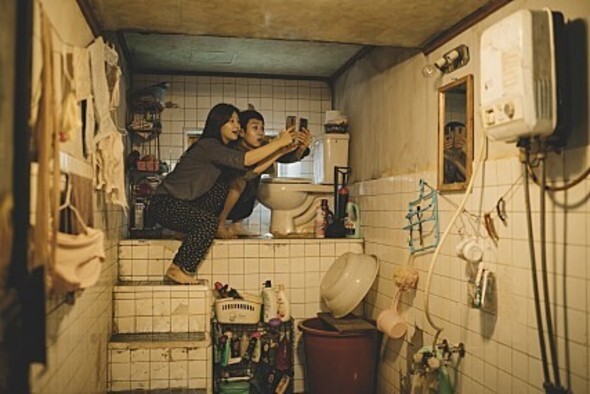hankyoreh
Links to other country sites 다른 나라 사이트 링크
[Interview] Bong Joon-ho eager to see S. Korean viewers’ response to “Parasite”

“Is ‘Parasite’ the best of my movies? I don’t know about that. I think I’ve also asked that question when I’ve seen other people’s movies. When Hirokazu Kore-eda won the Palme d'Or last year with ‘Shoplifters,’ in my mind I was thinking, ‘But really “Still Walking” (2008) is his best.’ Can I answer the question at the end of this year when things have calmed down a bit? [Chuckles].”
The interview with Bong Joon-ho – the 50-year-old filmmaker’s first since returning to South Korea on May 29 after winning the Palme d’Or at the Cannes Film Festival with his seventh film “Parasite” – kicked off with a somewhat aggressive question. While he appeared a bit taken aback, Bong added, “There’s a saying about how ‘a Buddhist monk can’t shave his own head.’ I don’t think I can give an answer yet on my work based on an objective standard. I will say that I think I felt fewer regrets after making it than with my other films.”
Bong Joon-ho is currently having a moment. Following the Cannes win, media reports are already predicting he could pick up Oscars for directing and screenwriting. One might expect him to be hyped up, but Bong said, “Cannes is already in the past. What I’m really curious about now is how South Korean viewers will respond. I’m planning to disguise myself and watch the movie together with an ordinary audience.”
“Parasite” tells the story of what happens when Ki-woo (played by Choi Woo-sik), the oldest son in an unemployed family headed by father Ki-taek (played by Song Kang-ho), goes to work as a tutor at the home of a rich company president named Park (played by Lee Sun-gyun). Moving deftly among a range of genres including comedy, thriller, and shocking tragedy, the film addresses a particularly deep-seated issue in South Korean society – class differences.
”Parasite” originally conceived as a play
“Parasite” was originally conceived as a theater script. While he was in the later stages of work on “Snowpiercer” in 2013, Bong heard a suggestion from actor Kim Roi-ha, a close friend who asked the director if he had ever thought about directing a play.
“As I considered possible subject matter for a play, I arrived at the idea of a spatially simple structure, Bong said. “Around 90 percent of ‘Parasite’ takes place either in Ki-taek’s semi-basement apartment or in Mr. Park’s luxury home. I always had that idea of a story represented by a poor family and a rich family.”

Importance of physical sensations in expressing class differences
He also paid close attention to details during filming in order to express the idea of a class divide.
“Cinematographer Hong Kyung-pyo and I focused on light as an expression of the wealth divide. So we have the semi-basement unit, which gets little natural light, and the luxury home, where light comes in all day long through enormous floor-to-ceiling windows. Even that contrast by itself makes you feel sad, doesn’t it?”
Also tying in with this are the different images of stairs that appear repeatedly in the film. If the front and back car contrast in “Snowpiercer” used horizontal imagery to represent inequality, “Parasite” does the same with vertical imagery.
“You know how the bathroom is the only thing above the stairs for the semi-basement set? With actual semi-basement units, they build the bathrooms like that to prevent the septic tank from backing up. A lot of internet users post images with jokes about ‘shit altars,’” he explained with a laugh.
“Another important image expressing vertical inequality is the rain and water pouring later on when it floods and the semi-basement apartment is inundated.”
Smell is another key element that dominates the film throughout.
“Scent is one of the most intimate and private areas of human life. Even married couples find it tough to talk about smells. They’re a good illustration of the lines we have to observe as people, of etiquette and rudeness. Jobs like driving, which is what Ki-taek’s family does in the movie, are the only category of profession where the rich and poor can narrow the personal distance between them and experience each other’s smells. You can get a sense of that from the fact that most of the incidents involving abusive behavior by rich people in the news these days take place inside of cars.”
When asked whether the monumental honors “Parasite” received before its release might make it difficult to have a free debate over the film, Bong replied, “The film was completed in late March, and nothing’s changed since the Cannes award. I hope that people will watch the film without thinking about the awards, but I suppose it won’t be that easy now.”
Even for a director like Bong Joon-ho, the question of the film’s break-even point is unavoidable.
“The net production costs were 13 billion won (US$10.92 million). Everyone has the basic goal of laying the foundation to keep making movies as a working director without losing anyone money. So far in my career, I’ve followed where my impulses have led me with my films, and I’ve been lucky. I suppose that has a lot to do with appealing and persuasive actors like Song Kang-ho, who do a good job of bridging the gap between the audience and the story I want to tell.”
Bong’s skill at deftly grossing genre boundaries will also be on display with his next work.
“My next film will be about the same scale as ‘Parasite.’ It’s about a horrific incident that takes place in the middle of Seoul, and it has a bit of action in it.”
The prestige of the Cannes Palme d’Or now looks set to be a source of confidence for Bong going ahead.
By Yu Sun-hui, staff reporter
Please direct comments or questions to [english@hani.co.kr]

Editorial・opinion
![[Column] Has Korea, too, crossed the Rubicon on China? [Column] Has Korea, too, crossed the Rubicon on China?](https://flexible.img.hani.co.kr/flexible/normal/500/300/imgdb/original/2024/0419/9317135153409185.jpg) [Column] Has Korea, too, crossed the Rubicon on China?
[Column] Has Korea, too, crossed the Rubicon on China?![[Correspondent’s column] In Japan’s alliance with US, echoes of its past alliances with UK [Correspondent’s column] In Japan’s alliance with US, echoes of its past alliances with UK](https://flexible.img.hani.co.kr/flexible/normal/500/300/imgdb/original/2024/0419/2317135166563519.jpg) [Correspondent’s column] In Japan’s alliance with US, echoes of its past alliances with UK
[Correspondent’s column] In Japan’s alliance with US, echoes of its past alliances with UK- [Editorial] Does Yoon think the Korean public is wrong?
- [Editorial] As it bolsters its alliance with US, Japan must be accountable for past
- [Guest essay] Amending the Constitution is Yoon’s key to leaving office in public’s good graces
- [Editorial] 10 years on, lessons of Sewol tragedy must never be forgotten
- [Column] A death blow to Korea’s prosecutor politics
- [Correspondent’s column] The US and the end of Japanese pacifism
- [Guest essay] How Korea turned its trainee doctors into monsters
- [Guest essay] As someone who helped forge Seoul-Moscow ties, their status today troubles me
Most viewed articles
- 1[Column] The clock is ticking for Korea’s first lady
- 2[Column] Has Korea, too, crossed the Rubicon on China?
- 3After 2 months of delayed, denied medical care, Koreans worry worst may be yet to come
- 4US overtakes China as Korea’s top export market, prompting trade sanction jitters
- 5[Editorial] When the choice is kids or career, Korea will never overcome birth rate woes
- 6[Correspondent’s column] In Japan’s alliance with US, echoes of its past alliances with UK
- 7Hong Se-hwa, voice for tolerance whose memoir of exile touched a chord, dies at 76
- 8Nearly 1 in 5 N. Korean defectors say they regret coming to S. Korea
- 9John Linton, descendant of US missionaries and naturalized Korean citizen, to lead PPP’s reform effo
- 10Strong dollar isn’t all that’s pushing won exchange rate into to 1,400 range